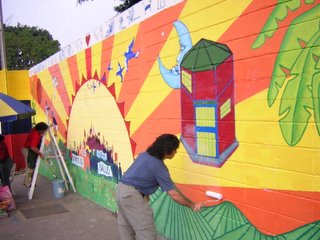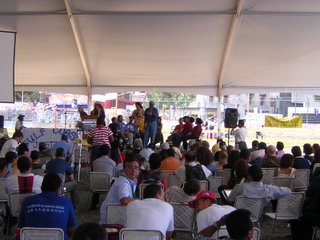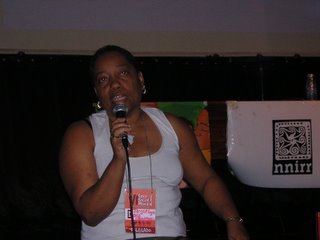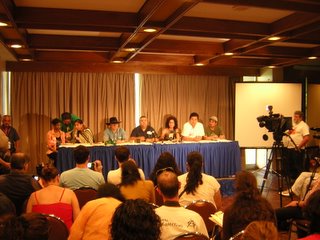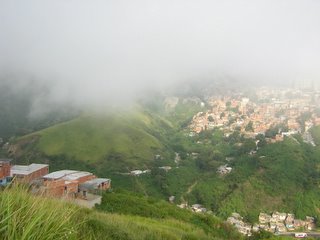Wednesday, November 29, 2006
Monday, October 16, 2006
NNIRR Report from the Border Social Forum
by Arnoldo Garcia & Colin Rajah
transcribed by Diana Pei Wu
The Border Social Forum (Foro Social Fronterizo), part of the World Social Forum process, was held in Ciudad Juárez, Chihuahua México, on the US-Mexico border with EL Paso, TX from Oct 13th-15th, 2006. Some 1000 people, representing social justice, immigrant rights and labor organizations, as well as indigenous communities, farmworkers, women, youth, African-Americans, and many others, converged on Juárez.
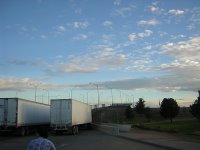 Ciudad Juárez is considered a laboratory for neoliberalism. The first maquiladoras of the global assembly lines, were first implemented in Juárez in the 1960s. It is also the site of mass repression against women maquiladora workers, including dozens of unaccounted murders. In this setting, all the discussions and program sessions were focused on creating alternatives to the militarized border where thousands of women, men and children have died as the result of US border policies and the US Department of Homeland Security.
Ciudad Juárez is considered a laboratory for neoliberalism. The first maquiladoras of the global assembly lines, were first implemented in Juárez in the 1960s. It is also the site of mass repression against women maquiladora workers, including dozens of unaccounted murders. In this setting, all the discussions and program sessions were focused on creating alternatives to the militarized border where thousands of women, men and children have died as the result of US border policies and the US Department of Homeland Security.THURSDAY, Oct 12

Prior to the official opening of the Border Social Forum, a number of border groups (including National Network member, the Agricultural Workers Center) organized a March Against NAFTA and Border Violence. Following that in the afternoon, participants embarked on a “border reality tour” to visit industrial sites and colonias (working class neighborhoods).
FRIDAY, Oct 13

The Border Social Forum had 14 themes or tracks of discussions, workshops, actions and proposals, including Globalization & Integration, US-Mexico Relations, Women & the Border, Labor & Workers, Environment & Justice, Health, Indigenous Peoples, Children & Elders, Youth, Human Rights, Art & Culture, Education & Communication, Food Sovereignty, and of course, Migration.
 The organizers kicked-off the Migration track with an opening panel on Migrant Struggles, that discussed the significance of the mass mobilizations in the past year. The panel opened with a presentation by National Network staff member Arnoldo Garcia who described the history of state repression in the region.
The organizers kicked-off the Migration track with an opening panel on Migrant Struggles, that discussed the significance of the mass mobilizations in the past year. The panel opened with a presentation by National Network staff member Arnoldo Garcia who described the history of state repression in the region. Other National Network members also mainly participated in the Migration track. Coalicion de Derechos Humanos from Arizona, Desis Rising Up & Moving -DRUM from New York, South Asian Network - SAN and Communities for Humane Immigrant Rights of Los Angeles - CHIRLA (both from Los Angeles), St. Peter’s Housing from San Francisco, Colonias Development Council and Agricultural Workers Center (both from the border in Texas), as well as NNIRR Board member Susan Alva, led an organizing workshop called “Building Walls, Destroying Rights: The International Implications of Immigration Legislation.” This workshop analyzed the panorama of anti-immigrant legislation, the immigrant fightback, and a proposal from the National Network for a US campaign for equity, liberty & justice.
Other National Network members also mainly participated in the Migration track. Coalicion de Derechos Humanos from Arizona, Desis Rising Up & Moving -DRUM from New York, South Asian Network - SAN and Communities for Humane Immigrant Rights of Los Angeles - CHIRLA (both from Los Angeles), St. Peter’s Housing from San Francisco, Colonias Development Council and Agricultural Workers Center (both from the border in Texas), as well as NNIRR Board member Susan Alva, led an organizing workshop called “Building Walls, Destroying Rights: The International Implications of Immigration Legislation.” This workshop analyzed the panorama of anti-immigrant legislation, the immigrant fightback, and a proposal from the National Network for a US campaign for equity, liberty & justice.SATURDAY, Oct 14

Most members of the National Network, (such as Coalicion de Derechos Humanos, DRUM, SAN, CHIRLA etc.) organized separate workshops on border violence and militarization. DRUM's workshop tied the militarization along the US-Mexico border to that in Palestine. The National Network also participated in a workshop organized by CHIRLA discussing interior immigration law enforcement issues, as well as one organized by the Grassroots Global Justice (GGJ) Alliance on "Black-Brown Alliance Building".
 Diverse community organizations and movements at the BSF presented a gamut of discussions, trainings, resources, video and audio to focus discussion on alternatives to the dominant forms of economic development now present. They also looked at the impacts of neoliberalism from indigenous peoples; land use to environmental justice to workers rights and all the challenges that variouos peoples (indigenous communities, working people and people of color) are facing.
Diverse community organizations and movements at the BSF presented a gamut of discussions, trainings, resources, video and audio to focus discussion on alternatives to the dominant forms of economic development now present. They also looked at the impacts of neoliberalism from indigenous peoples; land use to environmental justice to workers rights and all the challenges that variouos peoples (indigenous communities, working people and people of color) are facing. Saturday culminated in a march to the border and symbolic shutdown of it. It was estimated that more than 2000 people took part in this mass march that called for an end to the Border Wall of Death, and the rescinding of militarization at the border, as well the legislation and rhetoric that promotes it.
Saturday culminated in a march to the border and symbolic shutdown of it. It was estimated that more than 2000 people took part in this mass march that called for an end to the Border Wall of Death, and the rescinding of militarization at the border, as well the legislation and rhetoric that promotes it.SUNDAY, Oct 15
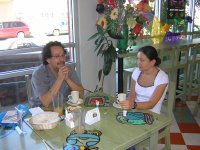 Each of the tracks presented a series of conclusions and proposals for action as a followup to the BSF. The National Network presented its proposal for a national campaign in the US to organize a national dialogue on the type of border communities want. This would feature human rights, solidarity and bringing diverse communities to meet their counterparts at the US-Mexico border to challenge the existing militarization and impunity at the border.
Each of the tracks presented a series of conclusions and proposals for action as a followup to the BSF. The National Network presented its proposal for a national campaign in the US to organize a national dialogue on the type of border communities want. This would feature human rights, solidarity and bringing diverse communities to meet their counterparts at the US-Mexico border to challenge the existing militarization and impunity at the border.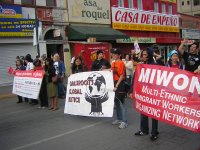 The outcomes from the Migration track recognize that the mass mobilizations of 2006 were the result of organized communities, especially over the last 10 years of work. It also emphasized that the current border militarization is part of the low intensity war being waged against migrants and border communities. The Migrant track put forth that toppling the border wall and ending militarization was a top priority.
The outcomes from the Migration track recognize that the mass mobilizations of 2006 were the result of organized communities, especially over the last 10 years of work. It also emphasized that the current border militarization is part of the low intensity war being waged against migrants and border communities. The Migrant track put forth that toppling the border wall and ending militarization was a top priority.The BSF participants by acclamation will organize a campaign to defend the rights of communities at the border to stop hate crimes and link it to stopping the war abroad as well. There is also a proposal for organized actions including boycotts and work stoppages for May 1, 2007. And finally, there are plans to hold a 2nd Border SF that is to held on Mexico’s southern border.

Friday, October 13, 2006
NNIRR at the Border Social Forum
REMINDER! -- NNIRR -- IRRTI 2006 - Scholarship Applications due Oct 18!
Register now!
Las solicitudes de beca y formularios de matriculación para el
3er Instituto Nacional de Capacitación ed Derechos Inmigrantes y Refugiados
se deben entregar para el dia 18 de octubre.
3rd National Immigrant and Refugee Rights Training Institute
Registration & Scholarship Application Forms are due October 18!
You can register in many ways. / se lo puedes hacer en varias maneras.
1. On paper: Go to our webpage and print out the forms and fax or mail them in:
Por escrito: Vaya a nuestra pagina de Web, imprime los formularios, llenarlos y mandelos a nosotros por fax o correo:
http://www.nnirr.org/projects/IRRTI2006/index.htm
2. Fill out the form online / Ahora, hazlotodo en la línea!
http://www.surveymonkey.com/s.asp?u=216322722859
un abrazo fuerte,
diana
* * * * *
Diana Pei Wu 吳珮珮
Program Director, Education & Capacity Building
National Network for Immigrant & Refugee Rights
310 8th Street, Suite 303
Oakland, CA 94607
Office: (510) 465-1984 x 304
Email: diana@nnirr.org
* * * * *
Diana Pei Wu 吳珮珮
coordinadora, programa de capacitación
red nacional pro derechos inmigrantes y refugiados
310 8th Street, Suite 303
Oakland, CA 94607
tel: (510) 465-1984 x 304
Email: diana@nnirr.org
Thursday, September 21, 2006
Stop Anti-Immigrant Sensenbrenner Bills! Call now.
Versión en español sigue
Stop the Sensenbrenner Anti-Immigrant Laws!
Call Your Two Senators and Representative NowThe Senate is poised to debate and vote on their counterpart legislation to the recently passed House Bill, the Secure Fence Act, H.R. 6061, which would build 700 miles of walls on the U.S.-Mexico border and would require the Department of Homeland Security to achieve "operational control" of the border as a condition before immigration reform is considered.
This week the House is expected to vote on three new immigration enforcement bills introduced by Representative Sensenbrenner (R-WI) from H.R. 4437. Now languishing in Congress, H.R. 4437, if made into law, would make being undocumented a felony and criminalize anyone who hires, assists, ministers to or cares for an undocumented immigrant.
Please call your two Senators and Congressional Representative, tell them:* Oppose and votes against the proposed laws in the House and Senate that promote border militarization and draconian immigration law enforcement measures. This legislation only criminalizes immigrant workers, families and communities. These policies have created untold suffering; thousands of migrants have already died at the border.
* Support genuine legalization that protects and expands the civil rights, civil liberties and labor rights of immigrant workers, families and communities.
* More border walls and militarization, guest worker programs, and detention and deportations make our communities vulnerable to exploitation and abuses.
* Only legalization with full rights, labor protections, and family reunification will work.
How to Contact your Congressional Delegation
* You can find out how to contact your Senators and Representative at http://www.facts-online.org/naoc_/leg-lookup/search.tcl* Or you can call the Congressional switchboard and ask to be connected to their offices: (202) 224-3121.
-------------------
¡Alto a las leyes anti-inmigrantes de Sensenbrenner!
Llame a sus dos Senadores y su Representante
El Senado está por debatir y votar sobre su proyecto de ley contraparte a la legislación recientemente aprobada por la Cámara de Representantes, el proyecto de ley "Acta de Muro Seguro ("Secure Fence Act"), H.R. 6061, que permitiría la construcción de case 700 millas de muros en la frontera entre EEUU y México y requeriría que el Departamento de Seguridad Nacional obtuviera el "control operative" de la frontera como precondición para considerer reformas migratorias.
Esta semana la Cámara de Representantes votara sobre tres nuevos proyectos de leyes de control policíaco migratorio, introducidos por el Representante Sensenbrenner (R-WI) de su proyecto de ley H.R. 4437. Ahora pendiente en en el Congreso, H.R. 4437, si llegaría a ser ley, calificaría de felonia el ser indocumentado y criminalizaría a cualquier persona que emplearía, ayudaría, comfortaría y cuidaría al inmigrante indocumentado.
Por favor contacte a sus dos Senadores y Representantes , dígales:* Opónganse a los proyectos de ley en la Cámara y en el Senado que promueven la militarización de la frontera y medidas represivas de control policíaco de la migración que solo criminalizan a los trabajadores, las familias y las comunidades de inmigrantes. Estas políticas han fomentado el sufrimiento sin cesar; miles de migrantes ya han muerto en la frontera como resultado de estas.
* Apoyen una legalización genuine que proteje y expande los derechos civiles, las libertades civiles y los derechos laborales de las y los trabajadores, familias y comunidades inmigrantes.
* Sólo una legalización con derechos plenos, protecciones laborales, y la reunificación de familias resolverá esta sitaución.
* Más muros y militarización en la frontera, más programas de trabajadores braceros (o huéspedes), y la detención y la deportación hace a nuestras comunidades vulnerables a la exploitación y los abusos.
Cómo contactar a su delegación Congresistas
* Puede hallar la información de contacto de sus 2 Senadores y Representante en:
http://www.facts-online.org/naoc_/leg-lookup/search.tcl
* O puede telefonear a la central telefónica del Congreso y pedir que sea conectado a las oficinas de sus 2 Senadores y Representante en: (202) 224-3121.
------------------
National Network for Immigrant and Refugee Rights
Red Nacional Pro Derechos Inmigrantes y Refugiados
310 8th Street Suite 303
Oakland, CA 94607
Tel (510) 465-1984
Fax (510) 465-1885
www.nnirr.org
Wednesday, September 13, 2006
MEDIA ADVISORY: Immigrant Communities in New York Join in Solidarity Rally with Migrant Leaders from Around the World on Eve of UN High Level Dialogue
September 13, 2006
Immigrant Communities in New Yorkand Migrant Leaders from Around the World rally to pressure UN High Level Dialogue on Migration & Development
What: Migrant Rights Rally & Media Briefing – rain or shine
New York, NY -- Organizational representatives and participants of the Community Dialogue on Migration, Development and Human Rights will gather on Thursday in Dag Hammarskjold Plaza across from the United Nations to voice their demands for migration policies recognizing and respecting basic human rights and dignity. The UN High Level Dialogue on Migration and Development, in which very few participants from civil society have been invited to participate, is taking place this week at the UN on September 14 and 15, 2006. While migration is increasingly being discussed within the High Level Dialogue in economic terms, and in terms of filling labor needs of countries’ economic development, migrant communities from around the world insist that the High Level Dialogue directly include the voices of affected communities and highlight the economic and political factors that displace communities and push people to migrate. In addition, any outcomes of the High Level Dialogue should counteract repressive immigration policies that curtail migrants’ rights.
When: Thursday, September 14, 2006; 5:00 pm – 7:00 pm
Where: Dag Hammarskjold Plaza (across from UN); East 44th Street & 1st Avenue; New York City.
Who:
* Mary Robinson, Realizing Rights: Ethical Globalization Initiative (EGI)
* Ellene Sana, Migrant Forum Asia (Phillippines)
* Catherine Tactaquin, National Network for Immigrant & Refugee Rights – NNIRR (USA)
* Carolyn de Leon Hermogenes, CAAAV: Organizing Asian Communities (New York)
* Natividad Obeso, MIREDES (Argentina)
Visuals & Audio: Rally with people from all over the world and New York; lots of colorful signs and art banners, NGO organizational representatives and participants from over 20 countries (including: Chile, Taiwán, Argentina, Phillippines, Thailand, Peru, Bolivia, Colombia, Brazil, Mexico, USA, Germany, Italy, Singapore, Indonesia, Lebanon, India, Bangladesh, Sri Lanka, Burma, Spain, Bosnia Herzegovina) speaking as many languages!
For more information, contact:
Jose Maria Dimaandal (Migrant Forum in Asia)
+ 63 (927) 877-5810
j_mod@rocketmail.com
Arnoldo Garcia (la Red Nacional pro Derechos Inmigrantes y Refugiados)
(510) 928-0685
agarcia@nnirr.org
Organized By: Migrant Rights International, Migrant Forum Asia, National Network for Immigrant and Refugee Rights, UN HLD Working Group and New York UNHLD Working Group.
-- 30 --
Tuesday, September 12, 2006
Civil Society Parallel Events and Activities on Migration, Development and Human Rights
September 12, 2006
(1) Lobbying/Embassy Hopping
September 12 is dedicated to conducting lobbying work with key permanent government missions (embassies) in New York so that the civil society could raise its concerns about the UNHLD process, deliver position papers and discuss key issues on migration and development from a civil society perspective.
Venue: Queens College Worker Education Extension Center located at 25 W 43rd Street Between 5th & 6th, New York City
Time: 9:00 to 9:15 am for the FINAL BRIEFING
(2) International Migrants Rights Solidarity and Cultural Evening
To raise awareness, dialogue, and connect migrants rights struggles from around the world with the local migrant/immigrant rights struggles in New York and the US
Venue: Judson Memorial Church (55 Washington Square South, between Thompson & Sullivan Streets)
Time: 6:00 to 9:00 pm
September 13-15, 2006
Community Dialogue on Migration, Development and Human Rights
To highlight key migration issues from a community perspective, share experiences on how migrant response organizations in various countries and regions are working to achieve international recognition and enforcement of migrants’ human rights, collectively inform participants on the intended goals of the UNHLD and its policy implications for global migration, human rights and development.
Topics:
1. Global Economic Systems: Empty Promises for Developing Countries and Forced Migration
2. War and Armed Conflict and its Impact on Local and Migrant Populations
3. Shared Responsibilities and Co-Development between sending and destination countries: Creating Strategies for Compensation and Remittances
4. Strategies for Advancing the Rights of Undocumented Migrant Workers in the Global Economy
5. National Immigration Policy Regimes: The ‘Race to the Bottom’ & Challenges for the Implementation of International Migrants Human Rights Standards
6. Enforcing Borders: An International Snapshot of How Border Enforcement Violates Core Standards of Migrants Human Rights
7. The Abuse of Migrant Workers with Impunity
8. The Feminization of Migration
9. The Migration-Trafficking Nexus
10 The Global Strategy Session for Migrant Domestic Workers Rights
11. Migrant LGBT (Lesbian, Gay, Bisexual and Transgendered) Rights
Venue: Queens College Worker Education Extension Center located at 25 W 43rd Street Between 5th & 6th, New York City
Time: 9:00 to 5:00 pm
For interviews and more information, please contact:
Joey Dimaandal, Media Officer for the MRI Civil Society Parallel Events during the United Nations High-Level Dialogue on Migration and Development in New York City
Tel: +639175267171, +639278775810
Email: j-mod@rocketmail.com
Address: West Side YMCA, 5 West 63rd Street between Broadway and Central Park West, New York City.
Arnoldo Garcia (For Spanish language media organizations), National Network for Immigrant and Refugee Rights www.nnirr.org
Tel +1 510 928 0685
Email: agarcia@nnirr.org
* MFA is a regional network of 260 migrant workers associations, trade unions and NGOs in Asia. The contact information of MFA:
Regional Coordinator: William Gois
Address: 59-B Malumanay Street, Teachers’ Village West, Quezon City, Philippines
Email address: mfa@pacific.net.hk Web: www.mfasia.org
** Migrant Rights International has members in Asia, Europe, North America and Latin America.
Migrants’ advocates to meet UN Permanent Mission to push for migrants rights in the upcoming UN High-Level Dialogue
September 12, 2006
Migrants’ advocates to meet UN Permanent Mission to push for migrants rights in the upcoming UN High-Level Dialogue
(New York City) Civil Society leaders and migrants’ rights advocates from the United States, Asia, the Middle East, Latin America and Europe gather in New York City today to meet with permanent mission representatives to the United Nations (UN) to present civil society perspectives on migration and development. The embassy visits are being organized by Migrant Forum in Asia (MFA) and Migrants Rights International (MRI) ahead of the United Nations High-Level Dialogue on Migration and Development on September 14-15, 2006.
“As part of the civil society, we exercise our right to speak out and deliver our position on critical issues related to migration and development,” says Sajida Ally, Programme Consultant of MRI. “It is imperative for us to present our perspectives to the permanent mission and government representatives. These are the people who will influence the course of the debate at the High-Level Dialogue. It is essential that they base discussions on the real situation of migrants’ human rights.”
According to MFA Regional Coordinator William Gois, the Asian delegates managed to secure appointments with the permanent missions of the Philippines, Bangladesh, Sri Lanka, Indonesia and South Korea. The Asian delegates called the Asian Alliance for Migration, Development and Human Rights will be presenting their recommendations to their government counterparts including the call to ratify and implement the 1990 International Convention on the Protection of the Rights of All Migrant Workers and Members of their Families as well as the relevant labor standards and other migration-related conventions of the International Labour Organization.
“Labor migration is quite dynamic in the Asian region which now hosts 53 million migrants, and it fast becoming an intra-regional phenomenon with around 2.5 million people a year moving within the region, says Mr. Gois. “The policy framework that will be created at the High-Level Dialogue as indicated by the Secretary General’s report leans more towards harnessing remittances as an economic benefit of migration. We are also concerned with the ‘co-development’ strategy wherein civil society has little or no participation at all. The main stakeholder in the migration process is the migrants themselves. Therefore, the policy on migration must be based primarily on the needs of people migrating,” adds Mr Gois.
MRI and MFA recommends for the establishment of a Permanent Forum on Migration that is inclusive and participatory. The group says that the forum should be a place to stimulate new ideas, approaches and perspectives in understanding migration and to enforce government commitments towards these.
“The forum should likewise include issues related to the contemporary nature of migration. A lot of things are happening and it is not just remittances. We must recognize that migration is a complex issue that should be based on human rights framework,” says Ms. Ally.
# # #
The Civil Society Parallel Events on Migration, Development and Human Rights are being held at the Queens College Workers Education Extension Center, 25 W 43rd Street between 5th and 6th Avenues in New York City until September 15, 2006.
For interviews and more information, please contact:
Joey Dimaandal
Tel: +639175267171, +639278775810
Email: j-mod@rocketmail.com
Address: West Side YMCA, 5 West 63rd Street between Broadway and Central Park West, New York City.
Arnoldo Garcia (For Spanish language media organizations)
Tel +1 510 928 0685
Email: agarcia@nnirr.org
+++
PARA DIFUSION INMEDIATA
12 de Septiembre, 2006
Defensores de derechos migrantes se reunirán con la Misión Permanente de la ONU exigiendo el cumplimiento de los derechos de las y los trabajadores migrantes en las reuniones próximas del Diálogo de Alto Nivel de la ONU
(Ciudad de Nueva York) Líderes y defensores de los derechos de las y los migrantes en la Sociedad Civil de los Estados Unidos, Asia, el Medio Oriente, América Latina y Europa están en Nueva York hoy para reunirse con representantes de la misión permanente de las Naciones Unidas (ONU) para presentar las perspectivas de la sociedad civil sobre la migración y el desarrollo. Las visitas a las embajadas han sido organizadas por el Foro Migrante en Asia (MFA, Migant Forum in Asia) y la Internacional de Derechos Migrantes (MRI, Migrant Rights International) en anticipación del Diálogo de Alto Nivel sobre la Migración y el Desarrollo de las Naciones Unidas el 14-15 de Septiembre, 2006.
“Como parte de la sociedad civil, ejercemos nuestro derecho a alzar la voz y entregarles nuestra perspectiva sobre temas críticas relacionados a la migración y el desarrollo,” dice Sajida Ally, Consultante de Programa de la MRI. “Es imperativo que nosotras presentemos nuestras posiciones a la misión permanente y los representantes de los gobiernos. Estos son los que influirán el curso del debate en el Diálogo de Alto Nivel. Es esencial que sus discusiones sean a base de la situación real de los derechos humanos de los y las migrantes.”
Según el coordinador regional del Foro Migrante en Asia (MFA), William Gois, los delegados asiáticos lograron conseguir reuniones con las misiones permanentes de las Filipinas, Bangladesh, Sri Lanka, Indonesia y Corea del Sur. Los delegados asiáticos llamados la Alianza Asiática por la Migración, Desarrollo y los Derechos Humanos están presentando sus recomendaciones a sus contrapartes gubernamentales incluyendo el llamado a ratificar e implementar la Convención Internacional sobre la Protección de los Derechos de los Trabajadores Migratorios y los Miembros de sus Familias de 1990 así como también las normas laborales relevantes y otras convenciones relacionadas a la migración a la Organización Internacional del Trabajo.
“La migración de trabajadores es muy dinámica en la región asiática la cual ahora es anfitriona a 53 millones de migrantes, y que rápidamente se está convirtiendo en un fenómeno intra-regional con unos 2.5 millones de personas por año moviéndose dentro de la región,” declara el Sr. Gois. “El marco político que será creado en el Diálogo de Alto Nivel como indicado por el informe del Secretario General tiende hacia el sometimiento de las remesas como un beneficio económico de la migración. Entonces, la política sobre migración tiene que ser basada principalmente en las necesidades de los pueblos en migración mismos,” añade el Sr. Gois.
La MRI y el MFA recomiendan el establecimiento de un Foro Permanente sobre la Migración que es inclusivo y participativo. El grupo dice que el foro debe de ser un espacio para estimular nuevas ideas, trayectorias y perspectivas en el entendimiento de la migración y para asegurar el cumplimiento de los gobiernos hacia éstas.
“El foro debe de incluir temas relacionados a la naturaleza actual de la migración. Muchas cosas están sucediendo y no sólo remesas. Tenemos que reconocer que la migración es un tema complejo que debe de ser basado en marco de los derechos humanos,” dice la Sra. Ally.
###
Los Evento Paralelos de la Sociedad Civil sobre a Migración, el Desarrollo, y los Derechos Humanos están siendo convocados en el Queens College Workers Education Extension Center (Centro Extensión Educativo de Trabajadores del Colegio de Queens), 25 W 43rd Street entre las Avenidas 5t y 6ta en la Ciudad de Nueva York City hasta el 15 de Septiembre, 2006.
Para entrevistas y más información, por favor de contactar:
Joey Dimaandal, portavoz de MRI para los eventos paralelos de la sociedad civil durante el Diálogo de Alto Nivel sobre Migración y Desarrollo de las Naciones Unidas en la Ciudad de Nueva York
Tel +639175267171, +639278775810
Correo electrónico: j-mod@rocketmail.com
Dirección: West Side MICA, 5 West 63rd Street, entre la Broadway y Central Park West, Ciudad de Nueva York
Arnoldo García (para los medios de comunicación en español)
Tel +1 (510) 928-0685
Correo electrónico: agarcia@nnirr.org
* MFA es una red regional de 260 asociaciones, sindicatos y ONGs de trabjadores migrantes en Asia. La información de contacto de MFA:
Coordinador regional: William Gois
Dirección: 59-B Malumanay Street, Teachers’ Village West, Quezón City, Las Filipinas
Correo electrónico: mfa@pacific.net.hk Web: www.mfasia.org
** La Internacional de Derechos Migrantes (MRI) tiene miembros en Asia, Europa, América del Norte y América Latina.
--30--
PRESS RELEASE [Sigue en espanyol]
September 12, 2006
Migrants’ advocates to meet UN Permanent Mission to push for migrants rights in the upcoming UN High-Level Dialogue
(New York City) Civil Society leaders and migrants’ rights advocates from the United States, Asia, the Middle East, Latin America and Europe gather in New York City today to meet with permanent mission representatives to the United Nations (UN) to present civil society perspectives on migration and development. The embassy visits are being organized by Migrant Forum in Asia (MFA) and Migrants Rights International (MRI) ahead of the United Nations High-Level Dialogue on Migration and Development on September 14-15, 2006.
“As part of the civil society, we exercise our right to speak out and deliver our position on critical issues related to migration and development,” says Sajida Ally, Programme Consultant of MRI. “It is imperative for us to present our perspectives to the permanent mission and government representatives. These are the people who will influence the course of the debate at the High-Level Dialogue. It is essential that they base discussions on the real situation of migrants’ human rights.”
According to MFA Regional Coordinator William Gois, the Asian delegates managed to secure appointments with the permanent missions of the Philippines, Bangladesh, Sri Lanka, Indonesia and South Korea. The Asian delegates called the Asian Alliance for Migration, Development and Human Rights will be presenting their recommendations to their government counterparts including the call to ratify and implement the 1990 International Convention on the Protection of the Rights of All Migrant Workers and Members of their Families as well as the relevant labor standards and other migration-related conventions of the International Labour Organization.
“Labor migration is quite dynamic in the Asian region which now hosts 53 million migrants, and it fast becoming an intra-regional phenomenon with around 2.5 million people a year moving within the region, says Mr. Gois. “The policy framework that will be created at the High-Level Dialogue as indicated by the Secretary General’s report leans more towards harnessing remittances as an economic benefit of migration. We are also concerned with the ‘co-development’ strategy wherein civil society has little or no participation at all. The main stakeholder in the migration process is the migrants themselves. Therefore, the policy on migration must be based primarily on the needs of people migrating,” adds Mr Gois.
MRI and MFA recommends for the establishment of a Permanent Forum on Migration that is inclusive and participatory. The group says that the forum should be a place to stimulate new ideas, approaches and perspectives in understanding migration and to enforce government commitments towards these.
“The forum should likewise include issues related to the contemporary nature of migration. A lot of things are happening and it is not just remittances. We must recognize that migration is a complex issue that should be based on human rights framework,” says Ms. Ally.
# # #
The Civil Society Parallel Events on Migration, Development and Human Rights are being held at the Queens College Workers Education Extension Center, 25 W 43rd Street between 5th and 6th Avenues in New York City until September 15, 2006.
For interviews and more information, please contact:
Joey Dimaandal
Tel: +639175267171, +639278775810
Email: j-mod@rocketmail.com
Address: West Side YMCA, 5 West 63rd Street between Broadway and Central Park West, New York City.
Arnoldo Garcia (For Spanish language media organizations)
Tel +1 510 928 0685
Email: agarcia@nnirr.org
+++
12 de Septiembre, 2006
Defensores de derechos migrantes se reunirán con la Misión Permanente de la ONU exigiendo el cumplimiento de los derechos de las y los trabajadores migrantes en las reuniones próximas del Diálogo de Alto Nivel de la ONU
(Ciudad de Nueva York) Líderes y defensores de los derechos de las y los migrantes en la Sociedad Civil de los Estados Unidos, Asia, el Medio Oriente, América Latina y Europa están en Nueva York hoy para reunirse con representantes de la misión permanente de las Naciones Unidas (ONU) para presentar las perspectivas de la sociedad civil sobre la migración y el desarrollo. Las visitas a las embajadas han sido organizadas por el Foro Migrante en Asia (MFA, Migant Forum in Asia) y la Internacional de Derechos Migrantes (MRI, Migrant Rights International) en anticipación del Diálogo de Alto Nivel sobre la Migración y el Desarrollo de las Naciones Unidas el 14-15 de Septiembre, 2006.
“Como parte de la sociedad civil, ejercemos nuestro derecho a alzar la voz y entregarles nuestra perspectiva sobre temas críticas relacionados a la migración y el desarrollo,” dice Sajida Ally, Consultante de Programa de la MRI. “Es imperativo que nosotras presentemos nuestras posiciones a la misión permanente y los representantes de los gobiernos. Estos son los que influirán el curso del debate en el Diálogo de Alto Nivel. Es esencial que sus discusiones sean a base de la situación real de los derechos humanos de los y las migrantes.”
Según el coordinador regional del Foro Migrante en Asia (MFA), William Gois, los delegados asiáticos lograron conseguir reuniones con las misiones permanentes de las Filipinas, Bangladesh, Sri Lanka, Indonesia y Corea del Sur. Los delegados asiáticos llamados la Alianza Asiática por la Migración, Desarrollo y los Derechos Humanos están presentando sus recomendaciones a sus contrapartes gubernamentales incluyendo el llamado a ratificar e implementar la Convención Internacional sobre la Protección de los Derechos de los Trabajadores Migratorios y los Miembros de sus Familias de 1990 así como también las normas laborales relevantes y otras convenciones relacionadas a la migración a la Organización Internacional del Trabajo.
“La migración de trabajadores es muy dinámica en la región asiática la cual ahora es anfitriona a 53 millones de migrantes, y que rápidamente se está convirtiendo en un fenómeno intra-regional con unos 2.5 millones de personas por año moviéndose dentro de la región,” declara el Sr. Gois. “El marco político que será creado en el Diálogo de Alto Nivel como indicado por el informe del Secretario General tiende hacia el sometimiento de las remesas como un beneficio económico de la migración. Entonces, la política sobre migración tiene que ser basada principalmente en las necesidades de los pueblos en migración mismos,” añade el Sr. Gois.
La MRI y el MFA recomiendan el establecimiento de un Foro Permanente sobre la Migración que es inclusivo y participativo. El grupo dice que el foro debe de ser un espacio para estimular nuevas ideas, trayectorias y perspectivas en el entendimiento de la migración y para asegurar el cumplimiento de los gobiernos hacia éstas.
“El foro debe de incluir temas relacionados a la naturaleza actual de la migración. Muchas cosas están sucediendo y no sólo remesas. Tenemos que reconocer que la migración es un tema complejo que debe de ser basado en marco de los derechos humanos,” dice la Sra. Ally.
###
Los Evento Paralelos de la Sociedad Civil sobre a Migración, el Desarrollo, y los Derechos Humanos están siendo convocados en el Queens College Workers Education Extension Center (Centro Extensión Educativo de Trabajadores del Colegio de Queens), 25 W 43rd Street entre las Avenidas 5ta y 6ta en la Ciudad de Nueva York City hasta el 15 de Septiembre, 2006.
Para entrevistas y más información, por favor de contactar:
Joey Dimaandal, portavoz de MRI para los eventos paralelos de la sociedad civil durante el Diálogo de Alto Nivel sobre Migración y Desarrollo de las Naciones Unidas en la Ciudad de Nueva York
Tel +639175267171, +639278775810
Correo electrónico: j-mod@rocketmail.com
Dirección: West Side MICA, 5 West 63rd Street, entre la Broadway y Central Park West, Ciudad de Nueva York
Arnoldo García (para los medios de comunicación en español)
Tel +1 (510) 928-0685
Correo electrónico: agarcia@nnirr.org
* MFA es una red regional de 260 asociaciones, sindicatos y ONGs de trabjadores migrantes en Asia. La información de contacto de MFA:
Coordinador regional: William Gois
Dirección: 59-B Malumanay Street, Teachers’ Village West, Quezón City, Las Filipinas
Correo electrónico: mfa@pacific.net.hk Web: www.mfasia.org
** La Internacional de Derechos Migrantes (MRI) tiene miembros en Asia, Europa, América del Norte y América Latina.
--30--
Monday, September 11, 2006
Migrants rights advocates pay tribute to undocumented migrant workers killed in 9-11; saying no human being is illegal
September 11, 2006
Migrants rights advocates pay tribute to undocumented migrant workers killed in 9-11; saying no human being is illegal
(New York City) Migrant workers and migrant rights organizations from the United States, Asia, Africa and Europe will converge at the Ground Zero this evening and join the New York-based immigrant rights advocates to recognize the heroism of hundreds of undocumented migrant workers killed in the September 2001 terror attacks. The early evening vigil also aims to challenge repressive migration policies across the globe and call for the ‘decriminalization’ of undocumented workers who are called illegal workers in many countries.
“Migrants are among the victims of that heinous and barbaric attack five years ago. Some of them did not have the proper documents as well. Would you call those people, who had served coffee, mopped the floors and cleaned the windows of the World Trade Center, illegal? They sacrificed their lives for this country during the 9-11 attacks,” says Catherine Tactaquin, Executive Director of the US-based National Network for Immigrant and Refugee Rights and member of Migrants Rights International. “Tens of thousands of migrant workers in the US face daily sacrifices including loss of life, as they toil to provide safe and healthy lives for their families,” she adds.
“An undocumented worker is not illegal. No human being is illegal. Undocumented migrant workers have the same rights as any other worker. Both contribute to the companies they worked for, the countries they reside in and the countries they will go home to,” says William Gois, the Regional Coordinator of Migrant Forum in Asia (MFA).
According to Mr. Gois, categorizing migrant workers who have no proper documents as illegals allows governments to conduct activities that will violate the rights of the migrants. In Asia, MFA has repeatedly condemned the Malaysian and South Korean governments for the violent crackdowns and arbitrary expulsions against undocumented workers.
“Stop the crackdowns and vicious raids. These are not the actions of mature and democratic societies. What we need here is the genuine recognition of the tremendous contribution of migrant workers to the development of host and home countries. These are the facts. Without these workers, there will be no food on your table, no clean clothes in your closet and no roof over your heads,” Mr. Gois says.
The various migrant rights groups are in New York City to attend and observe the United Nations High-Level Dialogue on Migration and Development on September 14 and 15. Ms. Tactaquin says that their group will also be organizing community dialogues on migration and talking with the different permanent mission representatives of the UN Member States to give their inputs on migration and highlight the perspectives of migrants and migrant civil society organizations.#
For interviews and more information, please contact:
Joey Dimaandal, (English only) Media Officer for the MRI Civil Society Parallel Events during the United Nations High-Level Dialogue on Migration and Development in New York City Tel: +639175267171, +639278775810
Email: https://webmail.speakeasy.net/cgi-bin/compose?id=00a9fe51cfed1004a6c7708200358e0e8d1&new=&xsl=compose.xsl&to=j-mod@rocketmail.com
Address: West Side YMCA, 5 West 63rd Street between Broadway and Central Park West, New York City.
Arnoldo Garcia (For Spanish language media organizations)
Tel +1 510 928 0685
Email: agarcia@nnirr.org
Diana Pei Wu (Mandarin Chinese)
Tel +1 510 847 9339
Email: Diana@nnirr.org
* MFA is a regional network of 260 migrant workers associations, trade unions and NGOs in Asia. The contact information of MFA: Regional Coordinator: William Gois Address: 59-B Malumanay Street, Teachers’ Village West, Quezon City, Philippines Email address: https://webmail.speakeasy.net/cgi-bin/compose?id=00a9fe51cfed1004a6c7708200358e0e8d1&new=&xsl=compose.xsl&to=mfa@pacific.net.hk Web: http://www.mfasia.org/
** Migrant Rights International has members in Asia, Europe, North America and Latin America
Monday, January 30, 2006
Growing Hope: Building a Movement of Change
Wednesday, January 25, 2006
Logistical Nightmares at the 6th WSF
The logistics were a nightmare. The main highway from the airport runs across a bridge that collapsed significantly a week ago. Timing could not be worse (and rumors of sabotage are rampant), as over 100,000 people from around the Americas converge into Caracas for the World Social Forum this week.
Most of our Grassroots Global Justice (GGJ) delegation made it in safe and sound however, in spite of 6-hour waits at the airport, 3-hour bus rides through windy mountain roads, and navigating massive traffic jams in the city to get to our hotel and orientation. And when we did, it was a coming home of sorts - connections and relationships among a vastly immigrant, people-of-color, grassroots delegation tug at not just the political, but our emotional bonds.
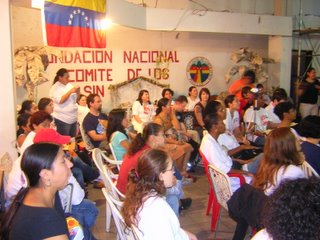 As other logistical "challenges" faced our orientation and meeting with a local host organization, we endured that with patience and tenacity. We formed out workgroups to embark on our mission this week - to make international/hemispheric grassroots connections with other communities in the Global South, and to challenge the stereotypes about U.S. society and communities.
As other logistical "challenges" faced our orientation and meeting with a local host organization, we endured that with patience and tenacity. We formed out workgroups to embark on our mission this week - to make international/hemispheric grassroots connections with other communities in the Global South, and to challenge the stereotypes about U.S. society and communities.Most importantly for us, presenting a broader, more diverse representation of immigrant communities in the U.S. who have to endure forced displacements in their home countries, and then oppressive political and economic forces in the U.S., is vital.
 But we confidently forged ahead, especially in the opening march. NNIRR board member Susan Alva, alongside NNIRR members from CAAAV, CHIRLA and the Florida Farmworkers Association, carried the NNIRR banner high as we joined in our larger delegation´s chant "...Justice for the Whole World!...Que Viva!"
But we confidently forged ahead, especially in the opening march. NNIRR board member Susan Alva, alongside NNIRR members from CAAAV, CHIRLA and the Florida Farmworkers Association, carried the NNIRR banner high as we joined in our larger delegation´s chant "...Justice for the Whole World!...Que Viva!"So the 6th WSF week has begun, in spite of the challenges. And as we look forward to this week, we know we´ll face even more challenges, logistical and otherwise. In the wake of a Congressional bill that proposes to build a wall on the US-Mexico border and seeks to essentially separate the U.S. from all of Latin America, the concept of a united Americas seems remote and distant. But for people who build communities across these borders, we have something to say about it, and we will.
Saturday, January 21, 2006
NNIRR at the WSF in Caracas
The National Network for Immigrant and Refugee Rights (NNIRR) and a number of its members (CAAAV - Organizing Asian Communities, Committee for Humane Immigrant Rights in Los Angels - CHIRLA, Domestic Workers United - DWU, Farmworkers Association of Florida, Filipinos for Affirmative Action - FAA, Mujeres Unidas y Activas - MUA etc.) will be among the 120+ person grassroots US delegation of Grassroots Global Justice (GGJ) at the polycentric World Social Forum (WSF) in Caracas, Venezuela from January 24th through the 30th.
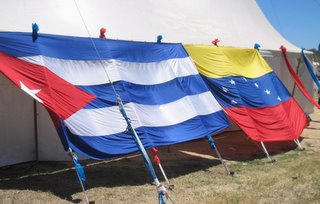 Among various activities, NNIRR will be organizing a workshop on "Globalization & Migrant Rights: Migrant Testimonies Challenging Neoliberal Economic Policies". The workshop details are as follows:
Among various activities, NNIRR will be organizing a workshop on "Globalization & Migrant Rights: Migrant Testimonies Challenging Neoliberal Economic Policies". The workshop details are as follows:Date: Friday, Jan 27th
Time: 8:30-11:30am
Place: Sala 01 (Teatro), CELARG Altamira, Ave. Luis Roche
We invite all NNIRR allies and partners who will be Caracas for the WSF, to join us in our many activities, especially this critical workshop which seeks to expose the impact globalization has had on migration and migrant rights, and find ways to build a migrant rights movement around it.
Colin Rajah (NNIRR's International Program Coordinator) and Susan Alva (NNIRR's board member) will be coordinating NNIRR's caucus and presence at the WSF. They can be reached at:
Hotel Conde, Esquina el Conde, Caracas
+58-212-811-1171
crajah@nnirr.org
Please watch this space for updates directly from Caracas in the next few days...











